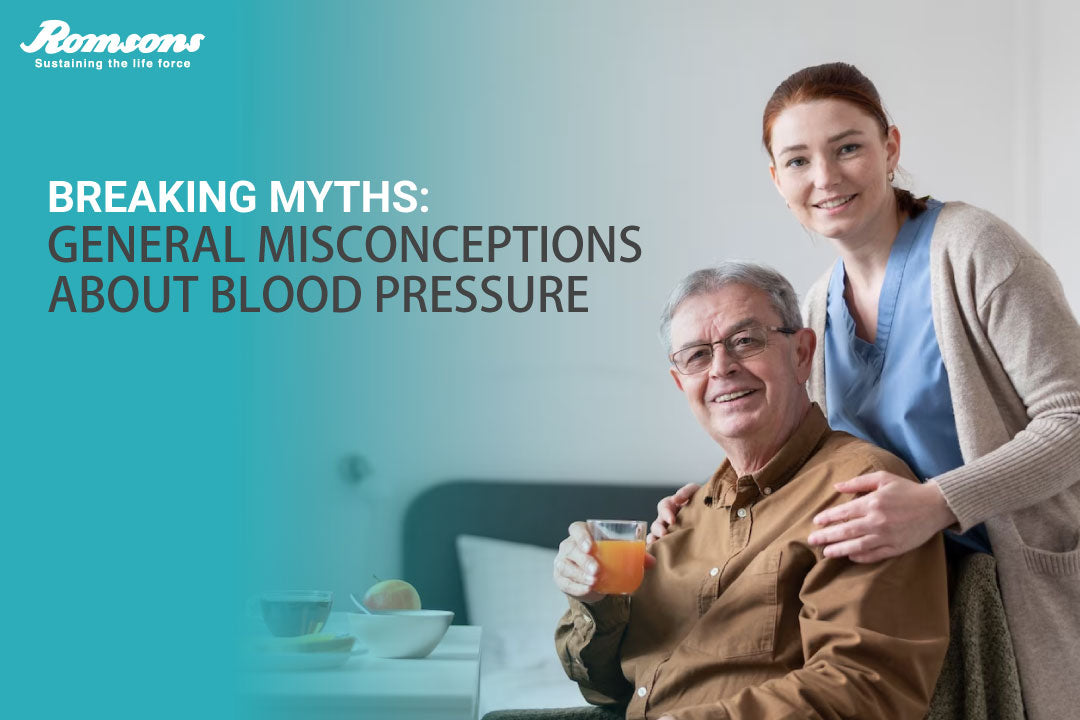Breaking Myths: General Misconceptions About Blood Pressure

Blood pressure is a vital indicator of cardiovascular health, yet it remains a topic fraught with misconceptions and misunderstandings. Despite its importance, many people lack a clear understanding of what blood pressure is, how it works, and the implications it carries on overall health. Due to its significance in gauging cardiovascular health, many myths persist around what constitutes healthy blood pressure levels and how to manage them. We delve into some of the most prevalent misconceptions about blood pressure and shed light on the truth behind them.
Common Misunderstandings About Blood Pressure
Understanding the facts about blood pressure and shattering the myths around it will help individuals take proactive steps to monitor and manage their cardiovascular health effectively. Check out some common misunderstandings about blood pressure:
Myth 1: Only The Elderly Should Be Concerned About Blood Pressure
One of the most widespread misconceptions is that high blood pressure only affects older adults. While it's true that the risk of hypertension increases with age, younger individuals are not exempted from it. Poor dietary habits, sedentary lifestyles, obesity, and stress can contribute towards high blood pressure at any age. Hence, it's essential for individuals of all age groups to monitor their blood pressure regularly and adopt healthy lifestyle habits to prevent hypertension.
Myth 2: High Blood Pressure is Always Accompanied by Symptoms
Contrary to the popular belief, high blood pressure often presents with no noticeable symptoms, earning it the moniker, "silent killer." Many people may have had hypertension for years without experiencing any symptoms, which can lead to severe complications such as heart disease, stroke, or kidney failure. Regular blood pressure checks are crucial for the early detection and effective management of hypertension, especially in individuals with risk factors like obesity, family history, or a sedentary lifestyle.
Myth 3: Lowering Salt Intake is the Sole Solution for Managing Blood Pressure
While reducing salt intake is indeed beneficial for managing blood pressure, it's not the sole solution. A balanced approach that encompasses various lifestyle modifications is necessary for effective blood pressure management. This includes maintaining a healthy weight, engaging in regular physical activity, limiting alcohol consumption, managing stress levels, and following a diet rich in fruits, vegetables, whole grains, and lean proteins. By adopting a holistic approach, individuals can better control their blood pressure and reduce the risk of hypertension-related complications.
Myth 4: Blood Pressure Readings are Always Accurate
Although blood pressure measurements are a standard part of healthcare assessments, they are not infallible. Factors such as incorrect cuff size, improper positioning, recent physical activity, or even the individual's emotional state can influence blood pressure readings. Therefore, it's essential to ensure that measurements are taken under appropriate conditions by trained professionals to obtain accurate results. Additionally, occasional variations in blood pressure readings are normal, so it's important not to overreact on isolated instances of high readings but rather observe trends over time. Investing in a reliable blood pressure machine for home use can also aid in tracking trends and managing hypertension.
Myth 5: Medication is the Only Treatment for High Blood Pressure
While medication may be necessary to manage hypertension in some cases, it's not the only treatment option. Lifestyle modifications play a crucial role in preventing and managing high blood pressure. For individuals with prehypertension or mild hypertension, lifestyle changes alone may be sufficient to bring blood pressure levels under control. However, even for those requiring medication, lifestyle modifications can complement pharmacological treatment and improve overall cardiovascular health. It's essential for individuals to work closely with their healthcare providers to develop a comprehensive treatment plan tailored to their specific needs.
Myth 6: Only High Blood Pressure is a Concern
While high blood pressure (hypertension) rightfully garners significant attention due to its association with serious health risks, low blood pressure (hypotension) can also be problematic. While hypotension is generally not as concerning as hypertension, it can cause symptoms such as dizziness, fainting, fatigue, and difficulty in concentrating. In severe cases, hypotension may indicate underlying health issues such as dehydration, heart problems, or endocrine disorders. Therefore, it's important for individuals experiencing symptoms of low blood pressure to consult with a healthcare professional to determine the underlying cause and appropriate management.
Myth 7: Blood Pressure Can Be Lowered Instantly
Some people believe that blood pressure can be quickly lowered through simple actions like taking deep breaths or drinking water. While these strategies may provide temporary relief from stress-induced spikes in blood pressure, they are not effective long-term solutions for managing hypertension. Sustainable blood pressure control requires consistent lifestyle modifications, including regular exercise, dietary changes, stress management techniques, and adherence to prescribed medications when necessary. Patience and commitment to these lifestyle changes are the key to achieving and maintaining healthy blood pressure levels over time.
Myth 8: If You Have Low Blood Pressure, You Don't Need to Worry
While high blood pressure garners much attention due to its association with cardiovascular risk, low blood pressure (hypotension) can also have adverse effects on health. Symptoms of hypotension may include dizziness, fainting, fatigue, and difficulty in concentrating. In severe cases, hypotension can lead to shock, which is a life-threatening condition. While not as common as hypertension, hypotension should not be ignored, especially if it is causing symptoms or interfering with daily functioning.
Dispelling myths and misconceptions surrounding blood pressure is crucial for promoting optimal cardiovascular health, and thus, reducing the burden of hypertension-related complications. By understanding the truths behind common misconceptions, individuals can take proactive steps to monitor and manage their blood pressure effectively. Regular blood pressure checks, combined with lifestyle modifications recommended by healthcare professionals, form the cornerstone of hypertension prevention and management. Remember, knowledge is power when it comes to safeguarding your heart health, so stay informed and take control of your blood pressure for a healthier future.

